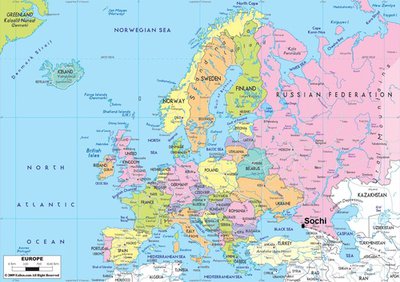You’ve probably skiied in the Alps, the US, Canada or New Zealand. But how many of us have ever skiied in Russia, and will the fact that the Winter Olympics are being held there make us want to go?
A few weeks ago, I took a trip to St. Petersburg, and came across the Sochi 2014 countdown clock on the Nevsky Prospekt. Because Russia is a completely alien place to me (in that I’d never been there before), it came as a surprise to come across a reference to something I knew about and recognised. Although St. Petersburg is very European for a Russian city, the Cyrillic script is just one aspect among many that highlights the cultural differences between here and there.. Like St. Petersburg, Sochi is also situated on the most westerly border of Russia, however, rather than meeting the Baltic sea, Sochi encounters the Black, and is right on the Caucasus border of Georgia.
We’re all aware that the 2014 Winter Olympics are happening, and we’re all really excited and supportive of our own nations athletes and favourite riders. Yet rarely do we appreciate – or at least talk about – the cultural implications and differences that skiing somewhere new can enforce. Although it is true that Sochi may not be as far away on a map as Cardrona or Queenstown, such an alternative resort certainly feels a lot less familiar than the popular places inhabited by us around the world at particular times of the year. With this in mind, there might be an awful lot more to learn and to gain from skiing in the areas that are so much less frequented by us, and it’s this cultural aspect of snowsports that the industry seems to lack. Whilst skiing or snowboarding might be ingrained in our hearts, it is not necessarily ingrained in (my own) British culture - and when we go to the Alps, the nearest that most of us get to appreciating an alpine lifestyle (apart from the skiing) is the tartiflette. It is a beautiful thing to embrace the mountains when we’re on our skis, and whilst our sport has the incredible ability to transcend cultural (or any other) differences, the opportunities to experience the community values in a new ski area often seem to be ignored.
Sochi 2014 will no doubt propel Russia towards the attention of
skiiers and snowboarders the world over, and it is true that for many of
us, traveling to somewhere like that for a trip is simply not
feasible (or affordable). In addition, heading to our favourite home
resorts often makes much more sense – knowing the best places to ride,
the best bars and the best people are obvious and important advantages,
and if we’re short of time, knowing the mountain often means getting the
most out if. This assurance means a lot, particularly when riding can
be dangerous. Referring back to Eric Poland’s horrendous accident – and
lack of competent, professional care – which happened in Sochi last year (http://news.lineskis.com/2013/02/08/eric-pollard-injury-update/),
being unable to understand or expect a particular standard from an
unfamiliar ski area can result in serious consequences. However, in the
case of the Olympics, we can only hope that appropriate support – both
in terms of medical and legislative – will be achieved, especially since
hundreds of athletes are already seizing the resort this month.
So venturing into the terrain of a new ski area – and a new culture – can be difficult. It calls for a different level of awareness and experience not only from the way you ride, but from the way you interact with an environment and operate as a person. Snowsports can be more than an activity – and using skiing or snowborading as a medium for culture could be an incredible way of experiencing more of the lifestyle that we all love so much. Let’s hope that those going to Sochi will appreciate more than the slopestyle course.


